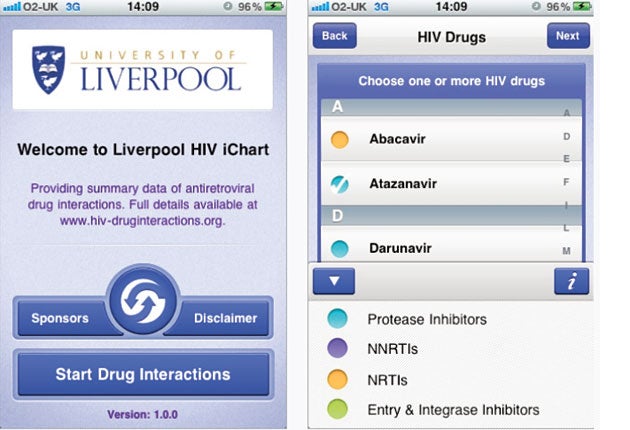HIV app: A small medical miracle
An ingenious new iPhone app is helping HIV patients avoid dangerous drug combinations

Your support helps us to tell the story
From reproductive rights to climate change to Big Tech, The Independent is on the ground when the story is developing. Whether it's investigating the financials of Elon Musk's pro-Trump PAC or producing our latest documentary, 'The A Word', which shines a light on the American women fighting for reproductive rights, we know how important it is to parse out the facts from the messaging.
At such a critical moment in US history, we need reporters on the ground. Your donation allows us to keep sending journalists to speak to both sides of the story.
The Independent is trusted by Americans across the entire political spectrum. And unlike many other quality news outlets, we choose not to lock Americans out of our reporting and analysis with paywalls. We believe quality journalism should be available to everyone, paid for by those who can afford it.
Your support makes all the difference.The growing complexity of HIV treatment has increased the risk of dangerous interactions that can trigger severe side effects in patients. Now, scientists at the University of Liverpool have developed an iPhone app, HIV iChart, that can tell doctors and patients which drug combinations are safe and which must be avoided.
As patients are living longer with HIV, more are receiving treatment for other conditions such as cancer and heart disease. There are currently 25 different anti-retroviral drugs available for the treatment of HIV and the number of potential adverse reactions with other drugs runs into the thousands.
Professor David Back, who led the team that developed the app with funding from the Elton John Aids Foundation, says the complexity of HIV treatment is now so great that the risks of interactions is severe.
"The average HIV patient is on three anti-retrovirals (ARVs) and they are getting older so they may also be on other drugs for cancer or heart disease. For example, you cannot take a cholesterol-lowering statin for heart disease with an ARV because the ARV stops the statin being broken down, increasing its level in the blood and putting patients at risk of the serious muscle wasting disorder rhabdolymisis.
"You cannot treat someone who has tuberculosis with the drug rifampicin because it knocks out the ARV by speeding its elimination from the body and you will get virological failure. If the patient was doing well on ARVs then treating them for TB with this drug will undo all the good work."
The app is a development out of a website launched by Professor Back, which lists 5,000 interactions.
"We had requests from doctors for a hand-held device that would enable them to check interactions immediately at the bedside. A lot of patients use it and find it helpful – sometimes they are better informed than their doctors. Now we want to take it to different platforms as quickly as possible – when we can get the funding," he said.
Within days of its launch last month, the app was one of the most popular in the medical field. Professor Back's team has since received a number of requests to supply it in other languages.
Join our commenting forum
Join thought-provoking conversations, follow other Independent readers and see their replies
Comments